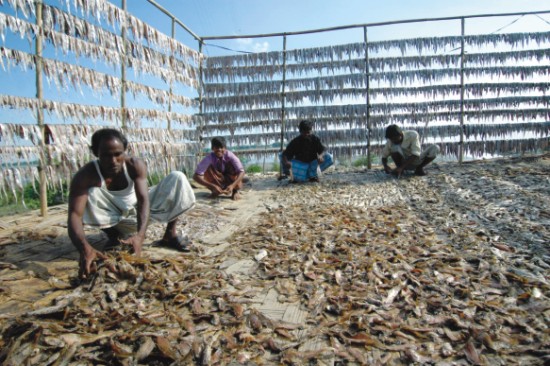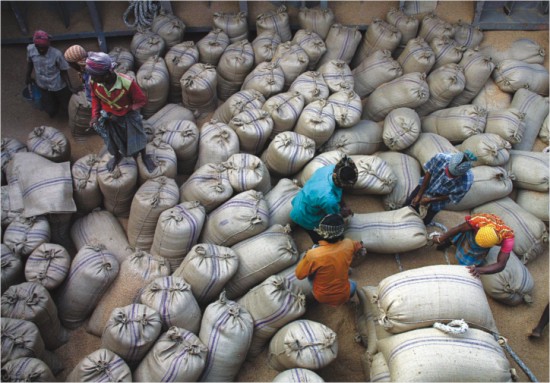
Inside
|
An Extreme Poverty Manifesto Joe Devine explains how we should put the poor first In 1996 I was carrying out research for my PhD on NGOs and poverty reduction in rural Bangladesh. One evening, after a long day trekking round aimlessly trying to find people to interview, I was sitting on the office veranda of a local NGO that had kindly offered me hospitality. It was a beautiful evening with one of those Bangladeshi sunsets that leave you breathless, even inspired. As usual, a number of people had gathered at the front of the NGO office hoping to be able to speak to the NGO leader or his senior staff. From among the crowd, an elderly woman slowly made her way towards me and asked if I could help her by talking to the NGO leader on her behalf. This was not an unusual request and I had become quite used to telling people that I neither worked for the NGO nor had the gravitas to influence its leaders. This time however the elderly woman ignored my response as she persisted in trying to get my attention. Those next to me on the veranda tried to gently move her away by asking her to join the queue of people at the front of the NGO office where 'she might be attended to'. Again unconvinced, she stubbornly held her ground. There was something admirable about her persistence and I began to chat with her. Not surprisingly, like many of the others congregating outside the office, she had travelled some distance to ask the NGO for help. Like many others, she was at pains to show how vulnerable and poor she was and how the weight of constantly having to face severe hardships was overburdening her. There was no need of course for her to explain this, her poverty was obvious; written on her face and carved probably forever into her flesh. But what was surprising about this woman was the way she talked of her poverty. As she recounted the list of things that were going wrong in her life and tried to convince everyone of her need for help, she continued to utter the phrase amar keu ney a phrase that was to radically alter the way I came to think about poverty in Bangladesh.
I quickly noticed that the phrase also struck a chord among my Bangladeshi colleagues sitting beside me that evening. It felt as if this woman could no longer be simply ushered to the back of the queue (which had grown considerably longer as our discussion evolved); the condition of amar keu ney meant that she somehow deserved to be treated in a different way from the others. In my company that evening were a number of NGO workers who were extremely dedicated and hardworking. I asked them to explain what amar keu ney meant and what, if anything, it told us differently about the lives of poor people. In the end, it was the elderly lady herself who came up with the clearest answer. In her view, most of the people in the queue were genuinely poor and she went on to explain how all poor people have little money and are probably in debt; have restricted employment opportunities and work for very low wages and in poor conditions; possess few assets of any value; suffer from long term health problems; sometimes experience real hunger; cannot afford to send their children to school. But, she argued, her poverty was different. While the poor are constantly exposed to different hazards, shocks and crises, they somehow manage a basic level of security in life. In other words, despite many setbacks, they survive. Her poverty was very different. Her ability to reach a basic level of welfare was fundamentally undermined by the fact that she could no longer count on anyone to help her out nor was she important enough to still count in the political calculations of others. To all extents and purposes, she was abandoned and excluded, and this rendered her poverty so much more severe and life threatening. Of course the distinction she drew that night is correct. There is no shortage of poor people in Bangladesh but many are potentially socially and economically active. They might move in and out of poverty but they somehow get by. However, there is a sizeable number of poor people whose ability to be active is severely restricted. These are the extreme poor who, more often than not, start and end their day worrying about the fact that in this life they have no one to rely on, no one to fall back on or turn to in difficult times. The amar keu ney kind of poverty is therefore not only about a deficit of assets or resources, it is also about an absence of any reliable network of support. It is about being isolated and invisible. During my discussion with the elderly lady, I turned to those sitting with me on the veranda and suggested that it was their responsibility to take care of her since it was unlikely that she could access government or NGO assistance. Inevitably, the response to my suggestion was muted and everyone seemed to find collective comfort in the 'fact' that it is impossible to help all the poor. Thirteen years have passed since my encounter with that lady and as I reflect on what it means to be extreme poor in Bangladesh today, I find myself returning to our conversation. The term 'extreme poor' has recently entered our development lexicon to refer to those who live way below the official poverty line. This is a form of poverty which is qualitatively different from the one we normally refer to in development discussions. In many ways, the discussion of amar keu ney was a precursor to recent discussions on extreme or chronic poverty as it helped distinguish different levels and experiences of poverty. Importantly the term's reference to support and relationships also signals the kind of approach that is needed if we are to make a real difference in the lives of the extreme poor. Bangladesh has a very successful track record of poverty reduction and has become a global pioneer of many innovative development initiatives. However, most of its success has been with the kind of people queuing outside of the NGO office: those poor who with support can become socially and economically active. The reality of extreme poverty is entirely different and to most, if not all of us, a bit of an unknown. What is clear though is that 'extreme poverty' and 'poverty' are not synonyms; being extremely poor is not simply having less assets and opportunities than the poor. Consequently, addressing the needs of the extreme poor can never be, in development terms, 'business as usual'. If we take a cue from the amar keu ney phrase, tackling extreme poverty is first and foremost about reverting situations where people find themselves completely adrift of supportive relations and networks. This is not a plea to return to some nostalgic or traditional lifestyle but an attempt to drag the debate on poverty to its rightful home: the world of politics and the domain of policy. The work of initiatives like DFID's shiree programme and its partners on extreme poverty has a very clear transfor-mational ambition: to support the establishment of a new political settlement in society which prioritises the needs of its most disadvantaged citizens. Reaching this settlement will require a deliberate political debate about the intersections between poverty, growth, rights, responsibility and redistribution in Bangladesh. This will not be an easy debate and many will resist if not completely ignore it. Others may simply hide from the debate just like my friends on the veranda that night who found comfort (and an excuse) in the fact that it was impossible to help all the poor. Regardless, Bangladesh is ready for this debate and it is essential that it takes place because the extreme poor will require support over a very long term. It may even be that signs of sustainable improvements will not be evident in this generation of extreme poor but in their children or grandchildren. There is no quick fix for extreme poverty and the support required to challenge and tackle intergenerational cycles of deprivation is not likely to come from aid agencies it needs to come from within Bangladeshi society.
How then to support the creation of a new political settlement? In a recent article, anthropologist Roderick Stirrat of the University of Sussex offers a set of stark reflections on the purpose of international development and the nature or motivation of those committed to international development work (See 'Mercenaries, Missionaries and Misfits: Representations of Development Personnel', in Critique of Anthropology, Vol. 28/4). It is an intriguing article which centres around three caricatures of the development worker: the mercenary, the missionary and the misfit. Typically the mercenary represents those who are motivated by personal interest and gain, and the missionary is motivated instead by a sense of ethical value and commitment. We can of course debate the usefulness of these stereotypes and Stirrat himself points out that they are neither mutually exclusive nor always dissimilar. Thus people can be mercenaries and missionaries at different points of their lives or careers, and perhaps even at different points of the same day! I personally am not that convinced by Stirrat's caricatures but I must admit a certain attraction to the figure of the misfit, which the author describes as someone who typically 'hankers after a different sort of world'. In many ways, if Bangladesh is to establish a new political settlement that really prioritises its most disadvantaged citizens, it will require similar misfits. It will need people who are prepared to go against the present political settlement and its priorities, challenge the basic rules of the game that distort the distribution of resources and opportunities which condemn many to a lifetime of disadvantage and make sure that in the future no one has to say amar keu ney. As reflected in a resounding way at Extreme Poverty Eradication Day last month, it is time to start working towards that new political settlement. Any volunteer misfits out there? The views expressed are those of the author and in no way reflect the views of their employers. Joe Devine is a lecturer in International Development and Head of the International Development Group at the Centre for Development Studies, University of Bath. His main research interests lie in wellbeing, poverty and inequality. |

